Hiroyasu Shiozu’s Experience with CO-OP in Japan
Share
I am a Japanese occupational therapist (predominantly in pediatrics) and an Assistant Professor at CHUBU University. I have worked as an occupational therapist for 13 years.
I first encountered CO-OP when I took a two-day basic workshop taught by Helene Polatajko in Japan in 2013. Before attending this workshop, I doubted the effectiveness of occupation-based practice. But I experienced real occupation-based practice in this workshop.
Then I started my practice and research using the CO-OP Approach. As a result, I have enabled dozens of children’s’ occupations through the CO-OP Approach. Moreover, my research papers have been published by the Japanese Occupational Therapy Research (in Japanese) – see the citations below. In May 2020 I became the first certified CO-OP therapist in Japan.
- Shiozu H: The Cognitive Orientation to daily Occupational Performance (CO-OP) Approach to developmental disabled clumsy child. Japanese Occupational Therapy Research, 38(3): 344-350, 2018. (in Japanese)
- Shiozu H: Home-visit occupational therapy based on the Cognitive Orientation to daily Occupational Performance (CO-OP) Approach to improving participation after stroke. Japanese Occupational Therapy Research 36(1): 81-88, 2017. (in Japanese)
Now I have three CO-OP projects in Japan.
First, I’m doing clinical practice and research into telehealth online (Figure 1). This started due to COVID-19 and working in collaboration with NPO Habilis and Hida City. This approach is twofold: first is to intervene directly by using Zoom (online intervention in both individual and group formats), second is to create opportunities for parents to review by watching video content online (see YouTube links below). I had experiences where clients achieved their goals using only an online approach. So, I think it is useful to use CO-OP online.

Figure 1. Framework of online CO-OP
[YouTube links] *All movies are in Japanese.
- Principle of child achievement (https://youtu.be/Nrg6fKLFKfM)
- The child chosen goals (https://youtu.be/9hJ47z1Rf20)
- Problem-solving framework (https://youtu.be/TChrm5-wIqg)
- Plan meeting (https://youtu.be/nuyjb9VdflA)
Second, I’m planning on introducing a CO-OP Approach to help support teachers in special needs education. I will do this through making a Japanese book for this intervention to be effective (published by CREATES KAMOGAWA Co.). This book’s title is “CO-OP Storybook”. I will collaborate with a designer to bring features of CO-OP into the book through graphics. As a result, I think that it will improve occupational performance and enablement by enhancing collaboration between children and teachers. Please look forward to the release of this book.
Third, I will support others in becoming Japanese CO-OP therapist candidates with members of the Japanese Occupational Performance Study Group. By increasing the number of Japanese CO-OP therapists, more children’s' lives will be improved. Furthermore, I will continue to promote the CO-OP Approach in Japan.
Finally, I would like to thank Helene and all ICAN members for this opportunity. I will be happy if I can connect and exchange information with CO-OP practitioners around the world through ICAN.
